The Rosenbergs: A Case of Love, Espionage, Deceit and Betrayal — Prologue — Crime Library
A network of spies, gleaning secrets of the atom bomb, a host of couriers and traitors, led by an insignificant man, assisted by a loyal wife, caught by the testimony of the wife’s brother, culminating in the unprecedented executions of both husband and wife this is the setting for the most sensational espionage case of World War Two and its aftermath: The case of Julius and Ethel Rosenberg.
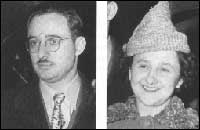
This death sentence is not surprising. It had to be. There had to be a Rosenberg Case because there had to be an intensification of the hysteria in America to make the Korean War acceptable to the American people. There had to be a hysteria and a fear sent through America in order to get increased war budgets. And there had to be a dagger thrust in the heart of the left to tell them that you are no longer gonna give five years for a Smith Act prosecution or one year for Contempt of Court, but we’re gonna kill ya!
Julius Rosenberg, as quoted by his attorney, Emanuel Bloch, September 22, 1953.
Any consideration of the Rosenberg atom bomb spy case has to acknowledge several uncomfortable facts. First, almost all of the participants, including the accused, the accusers, the prosecution, and the defense often appear to be unattractive, unsympathetic, and sad people. Some, particularly those who used Ethel as a pawn in a futile attempt to force Julius to confess, behaved dishonorably, cruelly, and without pity. Still others display passions that are difficult to understand. With a few exceptions, the long cast of characters in this case do not inspire admiration.
Second, as in the case of Sacco and Vanzetti, the Rosenberg trial took place in a Great Red Scare, but this time the paranoia was increased by the detonation of an atom bomb by Russia, the invasion of South Korea by the Communist North Koreans and Chinese, the numerous revelations and confessions of former communists and professed spies, and the intensity of the McCarthy mentality of the times. Layered on the political hysteria was the abhorrent circumstance of virulent anti-Semitism, intensified by the fact that virtually all of those concerned with this drama were Jewish.
Third, the case is inescapably an accelerating tragedy. As it proceeds to its end, one is left with the feeling that it begins in hindsight inconsequentially and ends with an unnecessary and problematic pair of executions. If the central participants had been kings or queens or gods, it would be the stuff of Greek tragedy. As it was, it is a love story of two average people, caught in their time by their own misguided loyalties and inability to fully understand their peril, brought to a sad end by a cast of less than admirable associates.
It may not be classic tragedy, but it is nonetheless high drama.
Julius and Ethel Rosenberg were charged with the crime of conspiracy to commit espionage, and tried under the Espionage Act of 1917.
The Cast of Characters, in order of appearance:
-
Igor Gouzenko, Soviet defector
-
Alan Nunn May, British scientist and spy
-
Robert Lamphere, FBI agent
-
Klaus Fuchs, British scientist and spy
-
James Skardon, MI5 agent
-
Harry Gold, “Raymond”
-
Elizabeth Bentley, the “Red Spy Queen”
-
Anatoli Yakovlev, NKVD agent
-
David Greenglass, Ethel Rosenberg’s brother
-
Ruth Greenglass, David’s wife
-
Julius Rosenberg
-
Ethel Greenglass Rosenberg
The trail leading up to their arrests is a complex web of espionage, defection, code-breaking, and confession. It is at the same time both thrilling and mundane, a drama of expert sleuthing and puzzling happenstance.
While the trail is not a straight line, a reasonable starting point is Canada, 1945. Igor Gouzenko, a code clerk attached to the Soviet embassy was about to be recalled to Russia. He defected to Canadian authorities, taking with him documents from the Soviet Embassy files. Shortly after Gouzenko’s defection, British physicist Alan Nunn May confessed to using his position on the National Research Council of Canada to gather information for the Soviets.
Then came the discovery of a partially burned KGB (formerly NKVD) code book in Finland. With this code book and a set of documents stolen from the New York offices of a KGB-front organization, the FBI, under the direction of Robert Lamphere, began to break the KGB code. One document decoded was a report on the progress of the Manhatten Project, the American effort to build an atomic bomb. The report had been written by Klaus Fuchs, a naturalized British physicist attached to the research group at Los Alamos. After several years, the decoding was finally completed in the summer of 1949.
The question that Lamphere and his colleagues had to ask was: Could Fuchs himself have been a spy while working at Los Alamos, or had Lamphere decoded a report written by Fuchs but obtained by a Soviet agent?
Both the American FBI and the British MI5 began to investigate Fuchs. Although the British had known for years that Fuchs had been a member of the German Communist Party in his youth (the 1930s) before emigrating to England, they had considered him more anti-fascist and anti-Nazi than communist, and had vouched for his reliability to the American authorities when the British team joined the American scientists at Los Alamos. Now, with the decoded report, his prior background became significant. Also, Fuchs’ name and address appeared in the Canadian documents taken by Gouzbenko and those connected to the Alan Nunn May affair. Finally, another decoded Soviet message made vague reference to a British atomic spy whose sister attended an American college and lived in the Boston area.
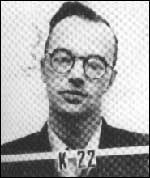
Fuchs had such a sister, who had attended Swarthmore College and was now living in Cambridge, Massachusetts.
Because the FBI did not want the Soviets to know that they had broken the KGB code, interrogators of Fuchs could not reveal their source. Further, they did not want the breaking of the code to be revealed in any court cases that might arise out of the decoding. Unbeknownst to the FBI, Russia knew of Lamphere’s success, because he had shared the information with a British Embassy official, Kim Philby. Philby was later discovered to be a Russian spy.
Fuchs, now at the British atomic energy research site at Harwell, England, was confronted by James Skardon of the British MI5, the noted spy-catcher. With gentle urging, not revealing the source of his information, Skardon induced Fuchs to confess.
In his confession, Fuchs recounted the atomic bomb information that he had delivered to the Soviets. He also told Skardon that he had a courier, known to him only as “Raymond.” With a physical description of Raymond given by Fuchs and verified by Fuchs’ sister and her husband, whom Raymond had visited in Cambridge seeking contact with Fuchs, the FBI narrowed their search to Jewish chemists with specific physical characteristics. Checking their files, the FBI were fortunate to produce three candidates. One of these could not have met Fuchs in New Mexico in 1945. The two others had surfaced before in 1947 before a federal grand jury. They had been named by Elizabeth Bentley, the “Red Spy Queen,” who had become an informer after the death of her lover and espionage control. In 1947, neither of the two were indicted. One of these two men was Harry Gold.
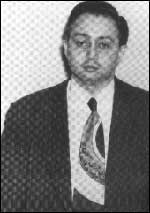
Almost simultaneously, Gold confessed to being “Raymond” and Fuchs, after some hesitation, identified a photograph of Gold as his courier.
Gold named his Soviet contact as “John,” in reality an NKVD agent, by the name of Anatoli Yakovlev, stationed in New York, but by 1950, returned to Russia. Yakovlev had instructed Gold not only to deliver documents from Fuchs to him, but to pick up documents in Albuquerque from an American soldier working at Los Alamos on the Manhatten Project. Gold vaguely identified the area where the soldier lived, gave a physical description of him, and recalled that the soldier’s wife’s name was “Ruth.”
The FBI quickly identified the Los Alamos soldier as David Greenglass. In his first interview with the FBI, Greenglass implicated his wife, Ruth, and his brother-in-law, Julius Rosenberg who was married to his sister, Ethel.
On July 17, 1950, Julius Rosenberg was arrested. Three weeks later, on August 11, 1950, Ethel Rosenberg was arrested. Both were held on $100,000 bonds, which neither of them could post. They were incarcerated in the New York House of Detention. As we shall see, they were found guilty of conspiracy to commit espionage on March 29, 1951, and sentenced to death on April 5, 1951.
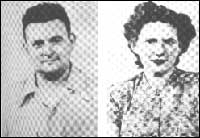
Friends and observers attest to their passion. When the two were being transported in a police van to their trial, separated by a strong wire grid, they clasped fingers between the grid, and tried to kiss one another through the barrier. On their first reunion in a conference room at Sing-Sing, they embraced each other so passionately, so lustfully, that guards separated them. They were never able to embrace again.
One of the saddest elements of the Rosenberg Case is the cruel manipulation of their love by the government, encouraged by FBI Director J. Edgar Hoover. After having been found guilty, Ethel was placed on Death Row in Sing-Sing, the sole occupant in a small cell in a dreary corridor of four cells. The separation of Julius and Ethel was intended as a lever to force Julius to confess, to name the members of his espionage ring. For a month, Ethel and Julius were sixty miles apart, communicating only through their lawyer, Emanuel Bloch, and by letters, written in pencil.
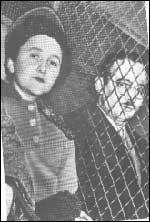
At the urging of Bloch, who was rightly concerned about Ethel’s mental state, Julius and Ethel were reunited at Sing-Sing. Still, they were separated by a concrete corridor and heavy metal doors, and they only saw each other on Wednesdays. They continued to communicate mainly through their letters.
At times, Ethel sang, and Julius could hear her. Her thin, sweet voice would cheer her husband, who greatly admired and praised her singing. She would sing arias, German lieder, and popular songs of the day. One of Julius’s favorites was “Good Night, Irene,” and on one occasion, after Ethel had sung it, Julius responded by inexpertly singing “The Battle Hymn of the Republic.” These two lovers, condemned to death and separated by thirty feet, singing to one another from their cells, is a particularly poignant image.
Their singing, monthly visits with Bloch, Michael, and Robert, and their letters were all that they could look forward to.
Their letters to one another during the three years they were in prison are remarkable. These letters, copies of which they made for their lawyer, Emanuel Bloch, clearly confirm their devotion to one another. Their letters appear in We Are Your Sons, written by Michael and Robert Meeropol (their adopted name) and in the volume edited by their sons. The Meeropols have been steadfast in their refusal to allow these letters to be quoted in any other books other than their own or in their edition of their parents’ letters.
But, curiously, these letters for all of their passion have an artificial quality to them. True, they are expressions of love, encouragement, fondness, and even (in the case of Ethel) lust, but they were written for a wider audience. They are strange combinations of affection, political righteousness, defensiveness, and self-delusion. It is difficult to find fault with these inconsistencies considering the dire nature of their plight but they are at times so overwritten that they are embarrassing. While they reveal the unconditional love the Rosenbergs had for one another, as well as the emotional pendulum between hope and despair that they both felt from time to time, they seem, for the most part, artificial.
The letters have moments of great and honest emotion. They also have a stilted language, particularly Ethel’s, who fancied herself as a writer of some gifts.
They reveal the family conflicts and the scars of existence that shaped both of them. Contrary to some of the rhetoric of the time, the Rosenbergs were not middle-class traitors selling out the country that had been so good to them. They were products of the Bronx Jewish ghetto, a world of walk-up cold-water flats and marginal existence, damaged by the horrors of the Great Depression.
Ethel, an aspiring actress and singer, was disparaged by her mother, Tessie Greenglass, all through her childhood and young adulthood. Indeed, right up to her execution, Tessie berated her for getting her younger brother, David, “in trouble.” Tessie was not only unloving favoring Ethel’s brothers over her but psychologically abusive. After her execution, Bernie wrote his brother David, reassuring him that he should not feel guilty about Ethel’s death, that she had brought it on herself.
Forced to work for a shipping company as a secretary, Ethel became involved in labor disputes, eventually becoming a member of the Young Communist League. By the time she met Julius in 1936, she was a committed communist.
Julius, while not embittered as the result of an abusive family, also grew up in urban poverty. His ardor for religion led his family to believe that he would become a rabbi. Eventually, he drifted away from religion and earned an engineering degree from CCNY. He too joined the Young Communist League, became active and a leader, and there, at the age of eighteen, he met Ethel Greenglass. It was love at first sight. Three years later, in 1939 when Julius graduated from CCNY, they married.
Neither of them had ever dated much. They found in each other not only love and passion, but a spiritual kinship in politics. Shortly after they were married, Julius obtained a position as a junior engineer with the Army Signal Corps. For five years, until 1945, Julius had the most financially rewarding existence of his life, allowing the Rosenbergs to live in very modest comfort. Then, as a result of a loyalty investigation, he lost his job with the Signal Corps. A copy of his Communist Party membership card from 1939 had been discovered. The Rosenbergs, with a young son, Michael, born in 1943, and a second son, Robert, born in 1947, fell on hard times.
Never again would the Rosenbergs know financial security. Despite their alleged work as spies, they never appeared to profit financially from espionage. Contrary to the rumor easily accepted by President Eisenhower, when he rejected their plea for clemency, Ethel was not the “strong one,” the brains behind the operation. Whatever had happened, Ethel was the loyal wife, lover, and help-mate.
The Rosenbergs: A Case of Love, Espionage, Deceit and Betray
The Trial
The Cast of Characters:
-
The Accused: Julius Rosenberg
-
Ethel Rosenberg
-
Morton Sobell
-
Anatoli Yakovlev (in absentia)
-
The Judge: Irving Kaufman
-
The Prosecution: Irving H. Saypol
-
Roy Cohn
-
The Defense: Emanuel Bloch
-
Alexander Bloch
-
Edward Kuntz
-
The Witnesses: Ruth Greenglass
-
David Greenglass
-
Harry Gold (previously sentenced to thirty years)
-
Max Elitcher
-
Elizabeth Bentley
-
Evelyn Cox
-
Ben Schneider
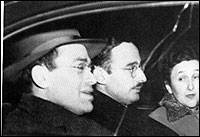
The trial of the Rosenbergs and their alleged conspirator Morton Sobell began on March 6, 1951. In order to place the trial in its context, it is important to note that the previous eighteen months had produced a series of events that created a climate of fear in the country.
Julius had been arrested on July 17, 1950, Ethel on August 11, 1950. Eleven and a half months earlier, Russia had detonated its first atomic bomb. From that date in August, 1949 to the beginning of their trial, the American public was subjected to a number of startling revelations.
January, 1950: Alger Hiss was convicted of perjury in the famous Hiss-Chambers spy case.
February, 1950:Senator Joseph P. McCarthy delivered his Wheeling, WV speech, proclaiming that the State Department had 205 subversives in its employ, dramatically waving a sheet of paper purportedly containing the names.
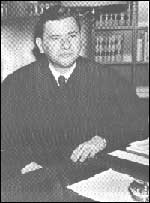
March, 1950: Klaus Fuchs was convicted and sentenced to fourteen years by a British court for violating Britain’s Official Secrets Act.
June, 1950: The Korean War began.
The trial was presided over by Judge Irving R. Kaufman, a forty-year-old legal prodigy. Kaufman was ambitious, known for his scholarly decisions, and a stern ruler of his trials.
The principal prosecutor was United States Attorney Irving H. Saypol. He was already famous for his successes against Alger Hiss, eleven Smith Act defendants accused of being communists, and his recent victory in the conviction of William Remington for perjury. Remington was a Commerce Department employee who, Elizabeth Bentley claimed, had passed classified documents to her.
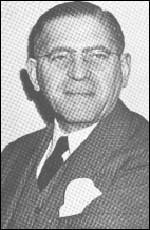
He was assisted by a very young, brash Roy Cohn, better known later as Senator McCarthy’s right-hand man. Cohn, in his autobiography, claims that it was he who got Kaufman assigned to the Rosenberg-Sobell trial. Further, he claims that it was he who manipulated the Department of Justice to appoint Saypol. According to Cohn, both men intensely wanted the assignments. While Cohn writes with grudging admiration for Kaufman, he considered Saypol to be an egotistical idiot. Most alarming, Cohn charges that he and Kaufman, and Saypol and Kaufman, had many ex parte discussions about the case. If this is so, it is at least unethical and at most prejudicial to the defendants.
The jury, made up mostly of accountants and auditors, none of whom were Jewish, was selected not only by the prosecutors and defense lawyers, but by Judge Kaufman as well. One would have thought that jury selection in such a case would have taken a long time, but it was completed in only a day and a half.
The Prosecution Presents its Case:
The government’s case against Morton Sobell was based largely on the testimony of Max Elichter, who testified that he had accompanied Sobell when a can of microfilm was delivered to Julius Rosenberg. Sobell and Elichter were fellow students at CCNY with Rosenberg. Several others, who were suspected of being part of the Rosenberg espionage ring, by the time of the trial had fled the country. They too were fellow students at CCNY. One of these defectors was Joel Barr, who became the leading force in the Soviet computer industry. He died in a Moscow hospital on August 1, 1998. The facts that Sobell had fled to Mexico and had been forcibly returned to the United States by the FBI, that he had used various aliases while in Mexico, and that he had used Elichter as a “mail-drop” while in Mexico was damaging to Sobell’s defense. His lawyer, Edward Kuntz, tried unsuccessfully to disparage Elichter’s testimony.
The case against the Rosenbergs was based mainly (but not exclusively) on the testimony of the Greenglasses and Harry Gold. Gold had already been sentenced to thirty years for his complicity in the Fuchs Case and his role in receiving documents from David Greenglass. David Greenglass would soon be sentenced to fifteen years, and Ruth Greenglass was an unindicted co-conspirator. O. John Rugge, the lawyer for the Greenglasses, had engineered the relatively light sentence for David and no sentence at all for Ruth by convincing them to cooperate with the government.
Gold testified that he had been given half of a Jello box to present to Greenglass in Albuquerque. David had the other half, and said that it had been prepared by Julius as a means of identification. He also identified himself to Greenglass with the words, “I come from Julius.” Earlier in his confession he had said that the signal was “I come from Ben,” but he changed it to “Julius” upon reflection. Fearing additional damage from Gold’s testimony, Emanuel Bloch took the unusual step of not cross-examining Gold.
The Greenglasses testified that Julius had induced David to join the Communist Party, and had urged Ruth to encourage David to steal atom bomb secrets. After the war, David and his brother Bernie joined Julius in the operation of a machine-shop, which was a failure and closed in 1947. After Harry Gold’s confession appeared in the newspapers in June, 1950, Julius urged David and Ruth and their small children to flee to Mexico. He gave the Greenglasses $4,000 to finance their escape. The money was eventually given to their lawyer, Rogge, for safe-keeping.
Ethel was implicated by her brother and sister-in-law. They recounted how Ethel had, in their presence, typed David Greenglass’s Los Alamos notes.
What was David Greenglass’s motive for testifying against his sister and her husband? Was it resentment over the failed business, and his cavalier treatment by Julius? Or did he consider the Rosenbergs at fault for their willingness to first recruit him to their cause, and then to sacrifice him for their fervent political beliefs? One might speculate that the combined forces of his wife, Ruth, and David and Ethel’s mother, Tessie, served to overcome David’s hesitancy on informing on his sister. Whatever his motives, David Greenglass was a grinning, unattractive witness who appeared to be gloating.
Despite his distasteful courtroom demeanor, his testimony was damaging. In addition to providing Gold with the names of scientists working on the atom bomb, he provided notes and sketches on the bomb’s design. Of particular importance (charged the prosecution) was a sketch of the “lens mold,” a device to “focus” energy for the bomb’s detonation by implosion.
During this testimony, Emanuel Bloch incredibly requested that Greenglass’s further testimony on the design of the bomb be given without spectators present. This, said Bloch, was to preserve “the secret of the atom bomb.” Judge Kaufman, asking Bloch if he was sure that was what he wanted, granted the request. The net effect was to convince the jury that David Greenglass had indeed passed vital secrets to Harry Gold, the culmination of the conspiracy designed by Julius Rosenberg. In reality, Greenglass’s description of the bomb was neither completely accurate nor particularly useful to the Soviets, who already were in possession of Klaus Fuchs’ much more accurate data. Bloch’s expression of patriotism merely enhanced the credibility of the government’s chief witness.
Upon cross-examination, Bloch attempted to demonstrate that Greenglass was a weak, easily manipulated, unbelievable witness. The attempt achieved little. David Greenglass held to his story, even stating that Julius was his hero who had convinced David that spying was the right thing to do at the time.
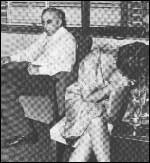
sentence (Nizer)
Ruth Greenglass was an impressive prosecution witness. Well groomed, calm, evidently well rehearsed, she confirmed her husband’s account of Ethel’s typing of the Los Alamos information. She added two more incidents that indicated Ethel’s role as a full partner in the espionage of her husband. One was her admission to Ruth that she did not find David’s handwriting difficult to decipher she was getting used to it. A second comment by Ruth was that Ethel had informed Ruth by letter that a meeting that Ruth was to have with her courier, Harry Gold, had been rescheduled.
Alexander Bloch, Ethel’s lawyer and Emanuel Bloch’s father, failed to move Ruth from her very precise testimony. Emanuel Bloch, taking over from his father in the cross-examination, was no more successful. While he tried to suggest that the money given by Julius to the Greenglasses was a return on their investment in the machine shop in effect, a business debt Julius made no suggestion that this was the case when he took the stand. Boldly, Ruth told Bloch that the money had come from the Russians, an assertion that could neither be supported or disproved.
Among the remaining prosecution witnesses was Dr. George Bernhardt, the Rosenbergs’ family physician. He testified that Julius had asked for information concerning the types of inoculations necessary to enter Mexico. The information, Julius told Bernhardt, was for a friend. While Dr. Bernhardt did not testify that Julius had actually asked him to forge medical certificates, his testimony supported David Greenglass’s contention that Julius was encouraging the Greenglasses to flee to Mexico.
Other witnesses called by Saypol added details to Sobell’s flight to Mexico, and Sobell’s use of aliases.
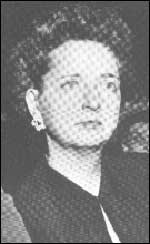
Unexpectedly, the prosecution reported that it had only Elizabeth Bentley to call, and that the prosecution’s case would be completed the following morning. This completely surprised the defense, who had been given a list of many more potential witnesses.
The last prosecution witness, then, was the “Red Spy Queen” herself. She was now a professional witness, and was literally making a career of testifying in Communist spy trials. She testified that her espionage control and lover, Jacob Golos, had picked up an envelope from a man resembling Julius Rosenberg. Since the incident had occurred in 1942, before the conspiracy supposedly began, it was not admissible. However, she reported that later she had received five or six calls from a man seeking meetings with Golos. The caller began each phone conversation with “This is Julius.” While this proved nothing code names were the usual method in communications among spies it probably had an impact on the jury.
On cross-examination, Bloch was unable to shake Bentley’s story. With her testimony completed, the prosecution for the time being rested its case.
The Defense:
Emanuel and Alexander Bloch would call only two witnesses: Julius and Ethel Rosenberg.
Julius, led through his testimony by Emanuel Bloch, denied each of the specific charges that prosecution witnesses had made against him. At several points, Judge Kaufman interrupted, asking Julius questions about Communism versus Capitalism. Then, in what was to prove most damning to the Rosenbergs, Kaufman asked if he had ever belonged to any group that discussed the Soviet system. After some hedging, Julius said, “Well, your Honor, I feel at this time that I refuse to answer a question that might tend to incriminate me.”
With his use of the Fifth Amendment, Julius lost the sympathy of the jurors. Alexander Bloch had argued against this strategy, proposing that being forthright about his “youthful idealism” would be preferable to assuming a veil of innocence. The jury already believed that the Rosenbergs were Communists anyway. His son and the Rosenbergs over-ruled him. The Rosenbergs not only wished to invoke the Fifth Amendment out of principle, but they wanted to avoid having to answer questions about their associates.
Saypol relentlessly cross-examined Julius. Indeed, he left traps that encouraged Julius to “take the Fifth” again and again. Finally, Saypol asked a series of questions about whether the Rosenbergs had had passport photos taken. Julius denied this, although he admitted that his family had had “snapshots” taken from time to time. Saypol asked him about a specific address of a photographer, but Julius was vague as to his ever having visited the photographer in question.
As had her husband, Ethel denied each of the allegations against her. However, her demeanor on the witness stand was to be her undoing. She was more than composed she was cold, contemptuous, almost arrogant, so much so that she gave the false impression that she was the one in charge of the Rosenberg spy ring.
Again, Saypol was able to induce the witness to invoke the Fifth Amendment. Then, seriously damaging her credibility, he asked why she was now answering some questions freely that she had refused to answer before the Grand Jury. She said that she couldn’t remember the reasons for her doing so.
While Ethel had every right to invoke the Fifth Amendment in either proceeding without a presumption of guilt as was confirmed by the Supreme Court some years later she, like her husband, had lost the jury’s sympathy.
Morton Sobell, on the advice of his attorney, Edward Kuntz, did not testify. Kuntz’ strategy was that there were two different conspiracies, and that his client had no part in the Rosenberg conspiracy.
To the surprise of the defense, the prosecution called three rebuttal witnesses. The first, Evelyn Cox, the Rosenbergs’ cleaning lady, disputed Ethel’s claim that a small console table had been purchased at Macy’s. The table, supposedly altered so that it could be used for microfilming, had been mentioned by Ruth Greenglass. Ethel had told Mrs. Cox that it had been a gift. While insignificant in itself, Mrs. Cox’s testimony seemed to confirm Ruth Greenglass’s truthfulness and make Ethel’s testimony seem devious.
The second rebuttal witness was the Greenglasses’ lawyer’s secretary, who confirmed receiving $3,900 from Ruth’s brother-in-law, reminding the jury of the supposed $4,000 given to the Greenglasses by Julius, to be used for their flight to Mexico.
The third witness was Ben Schneider, a photographer, who had taken three dozen passport photos of the Rosenbergs in mid-June, 1950, after David Greenglass’s arrest.
Unbeknownst to the defense, the prosecution had learned of the passport photos through a prison informer, Jerome Tartakow, Julius Rosenberg’s jailhouse chess partner.
Bloch could do little with the cross-examination of these three witnesses except to question the accuracy of their memories.
The summations were in stark contrast with one another. Bloch profusely thanked Judge Kaufman and prosecutor Saypol for their many courtesies and fairness. (This effusiveness would come back to haunt Bloch when he attempted to appeal on the basis on the trial judge’s prejudicial conduct of the trial.) Then he went on to attack the Greenglasses as repulsive individuals, people who would falsely accuse their own relatives in order to save their skins.
Kuntz, in summing up his defense of Morton Sobell, accused Max Elichter of perjury. Further, he attacked the government for dragging Sobell back from Mexico, in order to ensure an appearance of guilt.
Saypol was less gentle. He vigorously recounted the evidence, and castigated the accused for the terribleness of their crimes. He ended with:
These defendants stand before you in the face of overwhelming proof of this terrible disloyalty, proof which transcends any emotional consideration and must eliminate any consideration of sympathy.
No defendants ever stood before the bar of American justice less deserving of sympathy than these three.
Judge Kaufman charged the jury. The next morning at 11:00 a.m., the jury returned a verdict of guilty as charged for all three defendants. The date was March 29, 1951. Sentencing was scheduled for April 5th.
On April 5, 1951, Judge Kaufman pronounced sentence on Julius Rosenberg, Ethel Rosenberg, and Morton Sobell. At the sentencing, Kaufman announced that he would not ask prosecutor Saypol for his recommendation, and that, after much soul-searching, he had arrived at his decision on his own.
Over the years, from a variety of sources, it is clear that this was not the case. At least a month before the trial began, the Justice Department discussed the usefulness of the death penalty as a device to force Julius to confess. Surely, Kaufman was aware of these discussions.
Also, contrary to Kaufman’s contention, he sought advice. He solicited opinions from other federal judges, including Jerome Frank, who would later rule on an appeal from the Rosenbergs. Roy Cohn, who maintained that he had not discussed the possible penalties with Kaufman, states in his “autobiography” that he recommended death for all three defendants.
Irving Saypol was asked by Kaufman for his recommendation, and then told not to make a public pronouncement of it at the sentencing hearing. Saypol recommended death for Julius and Ethel, and thirty years for Morton Sobell. Kaufman instructed Saypol to find out what the Justice Department thought about the matter.
Uncomfortably for Kaufman, the FBI, including not only principal agent Lamphere but the Director, J. Edgar Hoover as well, recommended that Ethel not be given the death penalty. Hoover’s biographer suggests that the Director now regretted the strategy of using Ethel as a “lever” to induce Julius to confess, and thought that it would be terrible public relations to execute a mother of two young children. However, Hoover did think that Sobell should be given the death penalty along with Julius.
Kaufman took Saypol’s recommendation. Before pronouncing sentence, Emanuel Bloch appealed for a sentence less than the death penalty, arguing that the offenses had taken place when Russia was our ally. Kaufman pointed out that the espionage continued on after the war was over.
The sentences were harsh. Kaufman, in his sentencing Julius and Ethel to death, said:
[Your crime is worse than murder, for you put] into the hands of the Russians the A-bomb years before our best scientists predicted Russia would perfect the bomb has already caused, in my opinion, the Communist aggression in Korea, with the resultant casualties exceeding 50,000 and who knows but what that millions more innocent people may pay the price of your treason. Indeed, by your betrayal, you undoubtedly have altered the course of history to the disadvantage of our country.
Therefore, Julius and Ethel Rosenberg were sentenced to die in the electric chair sometime during the week of May 21, 1951. Morton Sobell received a sentence of thirty years in prison, with the judge’s recommendation that he serve the full term.
David Greenglass, whose sentencing had been put off until after the Rosenberg trial, received fifteen years. He had expected five. Considering the severity of the sentences of the three principals in the Rosenberg-Sobell trial, it would have been “unseemly” to sentence Greenglass lightly.
These harsh sentences should be compared to the sentences received by the British spies. As was mentioned, Alan Nunn May received ten years, Klaus Fuchs (whose offense was much more serious than that of the “Rosenberg Ring”) received fourteen years. Rebecca West quotes a Russian as saying:
In England, now that the war is over and espionage trials take place in open court, persons detected in espionage on behalf of the Soviet Union are instructed by whichever of our organizations it is which has been using them, to plead guilty and to admit to the police their participation in the particular crime of which they are accused, and nothing more. In the United States such persons are at present instructed to proceed in precisely the opposite way and to deny everything. This is a compliment to England. It is felt that British procedure is so efficient that if a false plea of not guilty is entered, it will be dectected … and other matters may be stirred up which will extend the scope of the inquiry into the doings of the Communists … In the United States, where legal proceedings are likely to be prolonged and confused, and all sorts of considerations may prevent the truth from appearing, it is worthwhile putting up a plea of not guilty, no matter how absurd this may be in view of the real facts.
So, the Rosenbergs were in the wrong place, the wrong country, and considering the wave of anti-communism and the war in Korea the wrong time.
The Russian quoted by Rebecca West was quite right: The legal proceedings were indeed prolonged and confused. The date of execution was stayed until the appeals could run their course. This was a little over two years, a period that began slowly, but, like all classic dramas, accelerated to a conclusion.
Additional Characters:
-
Judge Jerome Frank, Second Circuit Court of Appeals
-
Fyke Farmer, attorney
-
Daniel Marshall, attorney
-
William O. Douglas, Associate Justice, United States Supreme Court
-
Fred Vinson, Chief Justice, United States Supreme Court
-
other lawyers, clerks, etc.
The first significant appeal was almost nine months after the sentencing, January 10, 1952. The Rosenbergs were hopeful, for the Second Circuit Court of Appeals had on it the liberal jurist Jerome Frank. Judge Frank was noted for his opposition to the death penalty. However, he could find no basis for appeal on points of law, which were, after all, the only substantive issues upon which the Court of Appeals could rule. They allowed the verdict and the sentence to stand, although Judge Frank’s opinion suggested that the sentence could be commuted by the U.S. Supreme Court.
Eight months later, the Supreme Court denied certiorari, that is, refused to hear the case.
For the next eight months, while the Rosenbergs and Emanuel Bloch were on an emotional roller coaster, dipping between hope and despair, a number of things were happening.
The Communist Party of the United States had been uncharacteristically silent about the fate of the Rosenbergs. Then, after summary executions of political dissidents in Poland by the Communists almost all of them Jews things changed. In order to deflect world-wide criticism of anti-Semitism, communist parties throughout Europe and the United States began to defend the Rosenbergs’ innocence. Demonstrations of many thousands were held in the major cities of Europe.
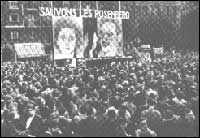
These demonstrations and the reversal of the Communist Party’s position were fueled by a series of articles in the National Guardian, which eventually led to the formation of the National Committee to Secure Justice in the Rosenberg Case. Similar committees were founded in Britain, France, and Italy. As the magazine’s series developed, Ethel contributed letters from prison to the National Guardian. Prominent individuals, such as Albert Einstein and the chemist Harold Urey,were enlisted for their support.
After the failure of their appeals, the Rosenbergs pinned their hopes on a groundswell of public support.
With an execution date now set for June 17, 1953, the Supreme Court was petitioned for a stay of execution. On June 13th, it refused.
President Eisenhower was petitioned for clemency. He refused, privately repeating the now generally accepted myth that Ethel was the true force behind the espionage ring.
Then, two lawyers, Fyke Farmer and Daniel Marshall, enter the drama. They had been brought into the Rosenberg case by a wealthy supporter of radical causes, Irwin Edelman. Farmer and Marshall, previously repulsed by Bloch in their efforts to help, took it on their own to approach Supreme Court Associate Justice William O. Douglas. The date was June 16, 1953, the day before the Rosenbergs were to be executed.
Douglas was in his office, packing books to be taken down to his waiting car, about to leave for the summer. Farmer and Marshall were able to have a few words with Douglas about a point of law that would place the death sentence in question. The Rosenbergs, tried under the Espionage Act of 1917, should not have been sentenced to death by Judge Kaufman, since the later law, the Atomic Secrets Act of 1946, held that only the jury could pronounce the death penalty.
The intrigued Douglas asked if Farmer and Marshall could produce a brief of their argument, and a record of the trial. They raced to the hotel room where Bloch and his colleagues had established a gloomy command post, desperately trying to produce one more appeal for presidential clemency. Within an hour, Farmer and Marshall returned to the Supreme Court, and Douglas, canceling his waiting car, took the materials from them. He and his clerks began to work.
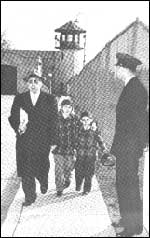
Sing-Sing (UPI)
Taking no chances, Bloch took the new petition for presidential clemency and the Rosenberg children and flew to Sing-Sing. The petition had to be signed by both Julius and Ethel. A tearful farewell was held between the children and their parents, and between the lawyer and his clients. The petition was signed, and Bloch and the children returned to Washington.
The next morning, Douglas announced his decision. The execution would be stayed. Since the U.S. Supreme Court would not be in session again until the first Monday in October, the Rosenbergs could now live for at least another six months.
The Attorney General, Herbert Brownell, challenged the stay. Then, in an unprecedented act, Chief Justice Fred Vinson called the entire court back in session for June 19th, in order to rule on the Attorney General’s challenge to Justice Douglas’s stay. Douglas heard the news on his car radio, already on the road toward his vacation destination. Justice Hugo Black, in the hospital for minor surgery, left the hospital for the session.
In a presentation marked by groveling, emotionalism, and vituperation, the Rosenberg lawyers challenged the integrity of the prosecution, the government, and the court. The government responded by carefully arguing the 1917 and 1946 laws. They concluded that the acts of espionage fell under the 1917, not the 1946, interpretation, and that Judge Kaufman was indeed permitted to pronounce a sentence of death. What if, the government argued, had the terms of the two laws been reversed? Would it be just to claim privilege under one law, and not the other? Can one law supersede another when both are in force?
After an hour, the Court ruled. Justice Douglas’s stay of execution would be put aside.
The execution, scheduled for 11:00 p.m., was to go forth. While the petition for clemency was rushed to the White House and again refused, Bloch pointed out that it was Friday, and the Sabbath would begin at sundown. Could the execution be rescheduled? Much to his horror, it was moved up to 8:00 p.m..
Julius went to his death pale, shaken, but quietly. Ethel’s execution was to follow, and she walked calmly to the electric chair, gently kissed one of the prison matrons on the cheek, and was electrocuted. However, Ethel was not dead after the first jolt. She had to be electrocuted a second time.
The execution of the Rosenbergs did not end the Rosenberg Case. For years many argued for their innocence, while others brought forth evidence of their guilt. At the least, it was justifiably argued that their ultimate penalty did not fit the crime.
Most of the principal actors are gone, although David and Ruth Greenglass live on, having changed their names. Eventually, Irving Kaufman was elevated to a seat on the Second Circuit Court of Appeals, the same court on which Jerome Frank served. Irving Saypol became a member of the New York State Supreme Court. Roy Cohn went on to fame and infamy with Senator McCarthy, eventually dying of AIDS. Emanuel Bloch died of a heart attack in January, 1954, a little more than seven months after the execution of his clients. Klaus Fuchs, after his release from prison in 1959, went to East Germany and eventually became the director of the Institute for Nuclear Research, dying there in 1988. Harry Gold died in 1974.
The Rosenberg drama persists to the present day, and it will no doubt persist beyond the lives of the participants still living. Books continue to be published, and revelations continue to appear.
It now seems clear that Julius Rosenberg was engaged in espionage. The CIA, in 1995, released “the Venona Cables,” decoded Soviet documents that demonstrate Rosenberg’s espionage activities. The Khrushchev memoirs mention Rosenberg’s spying for Russia. Released KGB files provide further evidence. Finally, Rosenberg’s Soviet contact, Alexander Feklisov, one of Klaus Fuchs’ Soviet contacts, admitted that he had met with Julius Rosenberg as early as 1943, when, as with all American Communists recruited for espionage, Julius left the Party.
Considering Ethel’s devotion to her husband, it is very likely that she participated in the espionage ring. But since she was burdened with various illnesses and a very difficult child (Michael), it may be that her involvement was peripheral, that of a help-mate.
The sons, Michael and Robert, were adopted by the Meerpols and took their adoptive parents name. As one would expect from loyal sons, they maintain the innocence of their parents. Both became college teachers.
As in all good dramas, the Rosenberg Case abounds with ironies. Spies convicted of much more serious acts of espionage, both during and since 1950, have received less severe sentences than the Rosenbergs. The death penalty has not been imposed for spying since 1953.
A second irony is that the Rosenberg espionage ring was, in a sense, at the periphery of spying. The information about the atom bomb passed to the Soviets by Alan Nunn May and Klaus Fuchs was much more significant to the development of the Russian bomb, but they had the good fortune to be tried by the British. Others have argued that it is not the significance of the information that the Rosenbergs passed, but the act itself.
The final irony is that the Rosenbergs chose to become martyrs to a cause that forty years later had, for all intents and purposes, disappeared.
Much has been written on the Rosenberg Case. A quick perusal of a public library will produce at least two dozen books, all of or a significant portion of deal with the Rosenbergs. Works sympathetic to Julius and Ethel are numerous, often suggesting a conspiracy on the part of the government, which is, in certain respects, true. Others, particularly those that are more recent, present evidence that the Rosenbergs were indeed guilty. Many of the latter are bolstered in their positions by Freedom of Information Act revelations, or by accounts and information obtained from recently released KGB files and personal accounts from Russian principals, both sources resulting from the break-up of the Soviet Union.
Whether authors are supportive of the Rosenbergs’ innocence or guilt, almost all agree that their executions were unwarranted.
Copies of theRosenberg Letters: A Complete Edition of the Prison Correspondence of Julius & Ethel Rosenberg, as was stated earlier, can be found in the two volumes produced by their sons, Michael and Robert Meeropol.
The Crime Library particularly recommends two books presently in print: Ilene Philipson’s psychobiography of Ethel Rosenberg, andRosenberg File, by Radosh and Milton. Both books are available in paperback editions. Several other volumes not currently in print that shed light on this case can be found in used bookstores for nominal amounts. Among these are the books by Lamphere and Nizer. The first describes the investigative process, the second analyzes the legal proceedings. Both have vivid depictions of people and events.
At least two novels have been written on the Rosenberg Case. The most well known is the one by E.L. Doctorow,Book of Daniel which has also been made into a film.
The second is by Tema Nason,Ethel; The Fictional Autobiography.
In addition to the 1983 film of Doctorow’s novel, now entitled “Daniel,” the Discovery Channel has produced “The Rosenberg File” (1997), and Court TV will telecast “The Rosenberg Trial” in October, 1998.
BOOKS: (publishing information varies; some are now available as reprints)
Doctorow, E.L. 1971.Book of Daniel. Random House.
Garber, Margerie, & Walkowitz, Rebecca, eds. 1995.Secret Agents: The Rosenberg Case, McCarthyism & Fifties America. Routledge.
Gentry, Curt. 1991.J. Edgar Hoover; The Man and the Secrets. Norton.
Goldstein, Alvin. 1975. The Unquiet Death of Julius and Ethel Rosenberg. Lawrence Hill.
Lamphere, Robert J., & Schachtman, Tom. 1986.FBI-KGB War; A Special Agent’s Story; A Special Agent’s Story. Random House.
Larsen, Anita and Marcy Dunn Ramsey,Rosenbergs
Meeropol, Robert & Meeropol, Michael. 1986.We Are Your Sons; The Legacy of Ethel and Julius Rosenberg. University of Illinois Press.
Meeropol, Michael, ed. 1994. The Rosenberg Letters. Garland.
Nason, Tema. 1980.Ethel; The Fictional Autobiography. Delacorte.
Navasky, Victor S. 1980. Naming Names. Viking.
Neville, John F. 1995.Press, the Rosenbergs & the Cold War. Greenwood.
Nizer, Louis. 1973. The Implosion Conspiracy. Doubleday.
Philipson, Ilene. 1993. Ethel Rosenberg: Beyond the Myths. Rutgers University Press.
Pilat, Oliver. 1952. The Atom Spies. Putnam.
Powers, Richard Gid. 1995. Not Without Honor: The History of American Anticommunism. Free Press.
Radosh, Ronald & Milton, Joyce. 1997. The Rosenberg File: A Search for the Truth. Yale University Press.
Rhodes, Richard. 1995.Dark Sun: The Making of the Hydrogen Bomb Touchstone.
Roberts, Sam. 2001. The Brother: The Untold Story of Atomic Spy David Greenglass and How He Sent His Sister Ethel Rosenberg to the Electric Chair. Random House.
Schneir, Walter & Schneir, Marian. 1983. Invitation to an Inquest. Pantheon.
Sharlitt, Joseph. 1989. Fatal Error. Scribners Reference Library.
Sharp, Malcolm. 1956. Was Justice Done? The Rosenberg-Sobell Case. Monthly Review Press.
Sobell, Morton. 1974. On Doing Time. Scribner.
Sudoplatov, Pavel, et al. 1994.Special Tasks
Teller, Edward. 2001. Memoirs: A twentieth Century Journey in Science and Politics. Perseus
Von Hoffman, Nicholas. 1988. Citizen Cohn. Doubleday.
West, Rebecca. 1964. The New Meaning of Treason. Viking.
Williams, Robert Chadwell. 1987.Klaus Fuchs, Atom Spy. Harvard University Press.
Yalkowsky, Stanley. 1990.Murder of the Rosenbergs. Crucible Publications.
Zion, Sidney. 1988. The Autobiography of Roy Cohn. Lyle Stuart.
RECENT ARTICLES: (all are from 1997)
Dobbs, Michael. “Julius Rosenberg Spied, Russian Says.” Washington Post, March 16
Milton, Joyce. “The Old Left: Fort McNair Postcard.” New Republic, April 11
Radosh, Ronald. “Final Verdict.” New Republic, April 11
Scheir, Walter. “Tales from the KGB.” Nation, April 7
